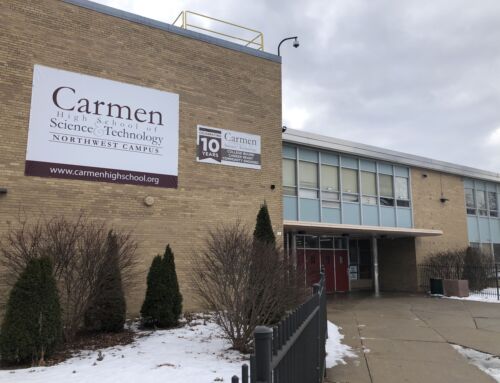A: As the cost of housing rises, Americans in Milwaukee and across the country face steep barriers to accessing quality, affordable housing. Housing isn’t just a roof over your head. It’s a source of dignity, community and the ability to participate and prosper in our society. Stable housing is the building block for families and communities like Milwaukee.
For those renting, rent is taking up more and more of their checks and too many are rent-burdened as a result. Similarly, homeownership is getting less attainable, with close to two-thirds of renters saying homeownership is unaffordable. In the last Congress, I was appointed to the Select Committee on Economic Disparity and Fairness and Growth, and I was tasked with focusing on combatting wealth inequality. A lack of access to affordable housing and racial disparities in homeownership are central to this challenge.
Programs like housing vouchers and the Low-Income Housing Tax Credit (LIHTC) play such a vital role. Programs like these are especially vital in cities like Milwaukee where low incomes – not high rental prices – are the primary driver of the city’s housing affordability gap. But these programs need to be improved so that they can deliver more relief to renters. We need more housing vouchers and we need to reform LIHTC so that it spurs more development of affordable rental housing. I am also supportive of legislative proposals in Congress to support home ownership for first-time buyers, such as through down payment assistance.
I serve on the Ways and Means Committee, which has broad jurisdiction over programs that can support economic development and reduce poverty. My committee seat gives me the opportunity to try and use the tools and resources available to me to push for policies that help Milwaukee. For example, I am a big proponent of expanding the Child Tax Credit. We saw the impact the American Rescue Plan Act (ARPA) changes had on reducing poverty – and we saw the devastating impact wrought by the temporary nature of that expansion. Likewise, we can expand the Low-Income Housing Tax Credit to address the need for more affordable housing. Our committee could also consider the Biden-Haris Administration’s proposal to take away tax breaks for large landlords who raised rents above 5 percent a year, or their proposal to provide tax credits for first-time homebuyers. Since I joined the Ways and Means Committee, I’ve championed expanding the Earned Income Tax Credit (EITC), which boosts the income of low-income workers. I also work closely on policies to increase access to child care. Every employer should support that goal.
In Congress, there is a lot of interest in guaranteeing we get this right. The Congressional Black Caucus (CBC) has launched the Artificial Intelligence Policy Series to explore the complex relationship that AI has with Black Americans. To date, the multi-part series has brought together thought leaders in academia, government, industry and civil society to engage in focused conversations on a variety of issues including misinformation related to voting rights and elections, civil rights and jobs equity, racial bias, and design and deployment.
A: As the mother of a teacher and the daughter of a teacher, I recognize the value of education. Foundational to a strong educational system is funding. We need to invest in our public education system – our students, our teachers.
We need to expand, not cut our investments. The Select Committee on Economic Disparity and Fairness in Growth noted in its final report that “Early childhood education has a transformative impact, as studies repeatedly show a significant return on investment and other long-term benefits both for individuals and the economy at large.” Right now, there are major income disparities that are determining which families can enroll their child in early childhood education. I believe that education is a great equalizer, and I am a living example of that. I am focused on ensuring that every family – no matter their income – can access the education they need to get ahead and succeed.
Children are our future and should be our country’s greatest investment!
But, if you look at all my Community Funded Projects, including those from before the moratorium that took place for over a decade, you will see a theme from me: I have fought for the pressing needs of my constituents.
- Public Transit – Every year we have had community projects since I came into office in 2005, I have pursued funding for our buses. These critical monies ensure my constituents can get where they need to go, whether that’s work, school or somewhere else.
- Housing – This is a critical issue in Milwaukee and elsewhere and continues to be. For FY 2025, I created an omnibus housing request (Housing and Homelessness Extraordinary Needs Support Project–$4.5 million) that bundles several requests for a variety of activities including housing repairs, housing for veterans, housing for the elderly and emergency payments to prevent evictions and keep people housed while addressing housing instability. I have another $2 million request for Milwaukee County for Affordable Housing connected to the McGovern Senior Center.
- Public Safety – I supported a project to allocate more funds for the Housing Authority of the City of Milwaukee for cameras and other equipment to increase security at its housing properties. Additionally, I requested funds for new radios for public safety for the city of West Allis and city of Milwaukee, along with a new fire truck for the city of Wauwatosa. I requested nearly $3 million for the Port to redevelop land and put it to good economic use to serve the community or to help it expand its passenger cruise business. I also have supported several requests that support economic development, like the Port of Milwaukee’s request to redevelop land to make better use of it and stimulate economic growth.
Unfortunately, despite great need in our communities, we were only able to receive a fraction of the funding that we initially requested. I will keep working to address challenges in our communities and use Congress’s power of the purse to support initiatives already doing this important work.





